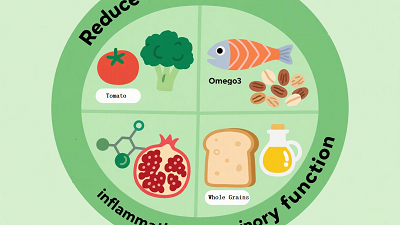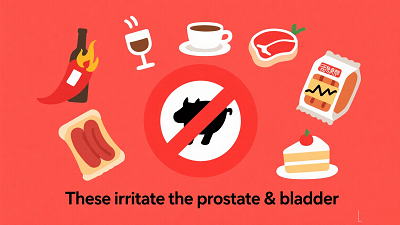Enlarged Prostate Diet Plan: Foods to Eat and Avoid
An enlarged prostate, or benign prostatic hyperplasia (BPH), affects millions of men as they age. While medical treatments are often necessary for moderate or severe cases, lifestyle choices—especially diet—can significantly influence urinary symptoms and overall prostate health [1][2].
An improper diet may worsen urgency, frequency, and nighttime urination, while a nutrient-rich, balanced diet can support bladder function, reduce inflammation, and help maintain a healthy weight. Many men report noticeable symptom relief after adjusting their daily meals and beverage choices [2].
How Diet Impacts Prostate Health
Research indicates that BPH is influenced by a combination of hormonal changes, inflammation, and oxidative stress. Foods rich in antioxidants, fiber, and healthy fats can counteract these factors. Conversely, diets high in red or processed meats, saturated fats, sugar, or excessive caffeine may exacerbate symptoms [1][2].
Practical insight: Swapping fried meals for baked or steamed alternatives not only improves general health but also reduces bladder irritation and abdominal pressure.

Foods That Support Prostate Health
Fruits and Vegetables
Fruits and vegetables are essential for prostate support. Lycopene-rich tomatoes, cruciferous vegetables like broccoli and kale, and berries are particularly beneficial [2]. They provide antioxidants that combat oxidative stress and may reduce prostatitis.
Tip: Aim for at least five servings per day, and try to include a variety of colors to maximize nutrient intake.
Fiber-Rich Whole Grains
High-fiber foods like oats, barley, quinoa, and beans help prevent constipation, which can increase pressure on the bladder and worsen urinary symptoms [1]. Whole grains also help control blood sugar and weight, both of which are linked to BPH progression.
Lean Proteins and Healthy Fats
Lean proteins from fish, chicken, or plant-based sources like lentils support muscle health without adding excessive saturated fat. Omega-3 fatty acids from salmon, sardines, walnuts, and flaxseeds have anti-inflammatory properties that may ease urinary discomfort [2].
Tip: Replace at least one serving of red meat per week with fish or plant protein to improve prostate health.
Foods to Limit or Avoid
Certain foods and drinks can aggravate urinary symptoms or contribute to prostate inflammation [1][3]:
1. Red and Processed Meats – Bacon, sausages, and fatty cuts of beef may worsen inflammation.
2. Full-Fat Dairy – Cream, cheese, and whole milk can aggravate symptoms in some men.
3. Caffeine – Coffee, tea, and energy drinks may increase urgency and frequency.
4. Alcohol – Particularly in the evening, alcohol can worsen nocturia.
5. Spicy Foods – Can irritate the urinary tract.
6. Sugary Foods – Promote weight gain and metabolic stress.
7. High-Sodium Processed Foods – Contribute to fluid retention.
8. Fried and Fast Foods – Increase fat intake and abdominal pressure.
Practical tip: Track personal triggers using a simple diary to identify foods that worsen your symptoms.

Common Diet Misconceptions
- "All dairy is bad" – Low-fat dairy can be included in moderation and provides calcium and protein.
- "Caffeine must be completely avoided" – Some men tolerate small amounts without symptom aggravation.
- "Eating less protein is better" – Protein is essential; the key is choosing lean or plant-based sources over red/processed meat.
Sample One-Day Diet Plan for Enlarged Prostate
Breakfast – Oatmeal with blueberries and walnuts; decaf green tea
Mid-Morning Snack – Low-fat Greek yogurt with flaxseed; an orange
Lunch – Grilled salmon, quinoa, and a large leafy greens salad with olive oil vinaigrette
Afternoon Snack – Carrot and cucumber sticks with hummus; small handful of almonds
Dinner – Lean chicken breast, steamed broccoli, brown rice, and sautéed mushrooms
Evening Snack – Apple slices with peanut butter; a small serving of yogurt
Tip: Swap salmon with tofu or sardines, broccoli with kale or spinach, and oatmeal with barley for variety. Avoid large, fluid-heavy meals in the evening to reduce nighttime urination.
Integrating Diet with Supportive Therapies
For men with persistent BPH symptoms, diet can be combined with other supportive therapies. Traditional herbal formulations, such as Diuretic and Anti-inflammatory Pill, are used in some practices to reduce urinary frequency, pelvic discomfort, and inflammation. These options are designed to address underlying inflammation rather than simply relieve symptoms.
Additional Lifestyle Tips
- Hydration timing: Drink sufficient water during the day but limit fluids 2–3 hours before bedtime [1][2][3].
- Weight management: Maintaining a healthy weight often improves urinary function.
- Exercise: Moderate activity, such as walking or swimming, supports overall prostate and cardiovascular health.
- Professional guidance: Always consult a doctor or nutritionist before starting new supplements or significant dietary changes.
Conclusion
Diet is a crucial component of managing an enlarged prostate. Prioritizing fruits, vegetables, fiber, lean proteins, and healthy fats while limiting red/processed meats, fried foods, caffeine, and alcohol can ease urinary symptoms and support long-term prostate health. Combined with lifestyle adjustments and appropriate therapies, including herbal support if suitable, men can experience better comfort, reduced inflammation, and improved quality of life [1][2][3].
References
[1] NHS. Enlarged prostate – Things you can do to help. (2025).
[2] Mayo Clinic. Enlarged prostate: Does diet play a role? (2025).
[3] National Institute of Diabetes and Digestive and Kidney Diseases (NIDDK). Prostate Problems. (2016).



